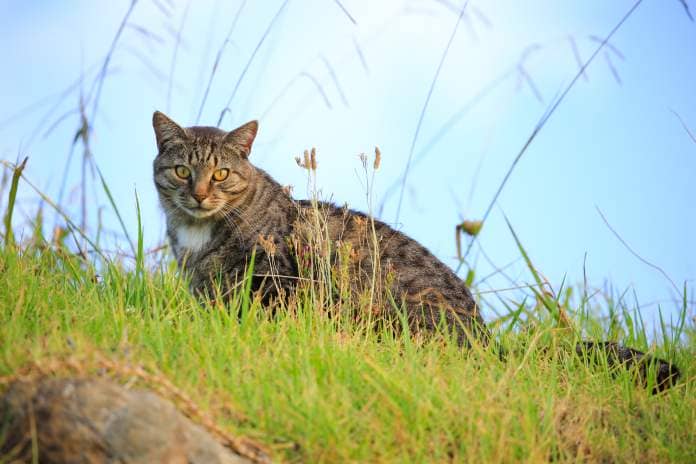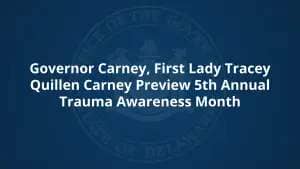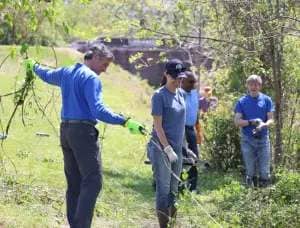News | Date Posted: Monday, May 22, 2023

During spring and summer, rabies, which is occasionally found in community cats and wildlife, is more likely to be transmitted to humans and pets due to our increase in outdoor activities. To avoid exposure to rabies, the Delaware Division of Public Health (DPH) advises residents to take the proper precautions.
Rabies is endemic in Delaware, meaning it occurs regularly within the state’s wildlife populations. Since 2018, 64 animals have tested positive for rabies in Delaware. That number represents only a fraction of rabies in Delaware since, in most cases, DPH only tests animals that have potentially exposed humans to rabies. The most common hosts of rabies in Delaware are community cats, bats, raccoons, skunks and foxes.
In 2018, Delaware detected its first fatal human rabies case in 77 years. It is unknown how the individual, a Kent County resident, became infected, although community cats were reported in the area. Community cats are defined as free-roaming, stray or feral cats.
Rabies is a nearly 100% fatal, yet preventable viral disease. People usually get rabies from the bite of a rabid animal. It is also possible, but rare, for people to get rabies from non-bite exposures, including scratches, abrasions or open wounds that are exposed to saliva or other potentially infectious material from a rabid animal. It is essential to take the following precautions to prevent rabies exposure and ensure a healthy and enjoyable summer.
How to Protect Yourself and Your Family from Rabies:
- Because animals can carry rabies without appearing sick, it is important to watch and enjoy wild and unknown animals from a distance.
- Wear thick gloves if you are handling a community cat whose vaccination history is unknown.
- Avoid hand-feeding wildlife.
- Teach children not to touch any unfamiliar animal and seek adult assistance immediately if a child is bitten or scratched by any animal.
- If a wild animal is on your property, keep your distance and let it wander away. Bring children and pets indoors and alert neighbors who might be outside. You may contact a nuisance wildlife control expert who will remove the animal for a fee. These professionals can be reached at wildlifehelp.org.
- Feed pets indoors.
- Tightly cap or put away garbage cans where animals cannot gain access to them.
- “Batproofing” should be done during the fall and winter months. Nuisance wildlife control experts can provide these services for a fee.
- Leave orphaned animals alone. Often, the parents are close by and will return for their young.
- Because pets can get rabies from wildlife and could then spread it to humans, preventing rabies in pets is also an important step in protecting yourself and others.
NOTE: the Department of Natural Resources and Environmental Control (DNREC) does not rehabilitate wildlife. The state issues permits to trained volunteers with experience rehabilitating wildlife and returning native animals to the wild. If you need a wildlife rehabilitator, contact the Delaware Council of Wildlife Rehabilitators and Educators.
How to protect your pets from rabies:
- Be sure your pet dogs, cats and ferrets are properly immunized against rabies. Remember, it’s the law.
-
- For more information about the state’s low-cost spay-neuter program for low-income pet owners, visit fixedandfab.com. For those that qualify, a rabies vaccination is also provided at no cost. Residents may also check with their local animal shelters and humane organizations for additional low-cost spay/neuter and vaccination clinics they offer the community.
- The best thing you can do for the community cats in your neighborhood is to vaccinate them, have them spayed or neutered and return them to where you found them.
- Keep family pets indoors at night. Never leave a pet outside unattended or let them roam free.
- Consider vaccinating livestock and horses as well. Consult with your private veterinarian if you have questions about whether your animal(s) should be vaccinated against rabies.
- If another animal injures your pet or presents with an unknown wound after being outdoors, contact your veterinarian for medical care. Your pet may need to be quarantined for a short time to ensure they were not exposed to a rabid animal.
-
- For any questions regarding an animal quarantine, contact the Delaware Department of Agriculture (DDA) at 302-698-4630.
If you have been potentially exposed to an animal infected with rabies:
- Wash all wounds thoroughly with soap and water and seek medical attention immediately, even if the wound seems minor.
- All medical providers are required to report potential human exposure to the DPH Rabies Hotline by calling 302-744-4990 or by completing the human exposure report found at https://www.dhss.delaware.gov/dhss/dph/dpc/rabies.html.
- If you encounter a wild animal behaving aggressively, it is recommended that you contact the DNREC Wildlife Section at 302-739-9912. Calls after hours and on weekends can be made to the 24-hour dispatch number 800-523-3336. Staff will determine whether referring callers to a private nuisance wildlife control operator is more appropriate. A listing of nuisance wildlife control operators can be found at wildlifehelp.org.
- If you encounter an aggressive stray domestic animal, such as a cat or dog, contact the Office of Animal Welfare (OAW) at 302-255-4646.
- To report a sick or hurt wild animal, Delaware residents are asked to contact the DNREC’s Wildlife Section at 302-739-9912 or 800-523-3336 after hours and on weekends. Staff will determine whether referring callers to a permitted volunteer wildlife rehabilitator is more appropriate.
- If you encounter a sick stray domestic animal, such as a cat or dog, contact OAW at 302-255-4646.
Related Topics: Delaware Department of Health and Social Services, Delaware Division of Public Health, Delaware rabies, DPH Rabies Program, rabies

Keep up to date by receiving a daily digest email, around noon, of current news release posts from state agencies on news.delaware.gov.
Here you can subscribe to future news updates.
-->
News | Date Posted: Monday, May 22, 2023

During spring and summer, rabies, which is occasionally found in community cats and wildlife, is more likely to be transmitted to humans and pets due to our increase in outdoor activities. To avoid exposure to rabies, the Delaware Division of Public Health (DPH) advises residents to take the proper precautions.
Rabies is endemic in Delaware, meaning it occurs regularly within the state’s wildlife populations. Since 2018, 64 animals have tested positive for rabies in Delaware. That number represents only a fraction of rabies in Delaware since, in most cases, DPH only tests animals that have potentially exposed humans to rabies. The most common hosts of rabies in Delaware are community cats, bats, raccoons, skunks and foxes.
In 2018, Delaware detected its first fatal human rabies case in 77 years. It is unknown how the individual, a Kent County resident, became infected, although community cats were reported in the area. Community cats are defined as free-roaming, stray or feral cats.
Rabies is a nearly 100% fatal, yet preventable viral disease. People usually get rabies from the bite of a rabid animal. It is also possible, but rare, for people to get rabies from non-bite exposures, including scratches, abrasions or open wounds that are exposed to saliva or other potentially infectious material from a rabid animal. It is essential to take the following precautions to prevent rabies exposure and ensure a healthy and enjoyable summer.
How to Protect Yourself and Your Family from Rabies:
- Because animals can carry rabies without appearing sick, it is important to watch and enjoy wild and unknown animals from a distance.
- Wear thick gloves if you are handling a community cat whose vaccination history is unknown.
- Avoid hand-feeding wildlife.
- Teach children not to touch any unfamiliar animal and seek adult assistance immediately if a child is bitten or scratched by any animal.
- If a wild animal is on your property, keep your distance and let it wander away. Bring children and pets indoors and alert neighbors who might be outside. You may contact a nuisance wildlife control expert who will remove the animal for a fee. These professionals can be reached at wildlifehelp.org.
- Feed pets indoors.
- Tightly cap or put away garbage cans where animals cannot gain access to them.
- “Batproofing” should be done during the fall and winter months. Nuisance wildlife control experts can provide these services for a fee.
- Leave orphaned animals alone. Often, the parents are close by and will return for their young.
- Because pets can get rabies from wildlife and could then spread it to humans, preventing rabies in pets is also an important step in protecting yourself and others.
NOTE: the Department of Natural Resources and Environmental Control (DNREC) does not rehabilitate wildlife. The state issues permits to trained volunteers with experience rehabilitating wildlife and returning native animals to the wild. If you need a wildlife rehabilitator, contact the Delaware Council of Wildlife Rehabilitators and Educators.
How to protect your pets from rabies:
- Be sure your pet dogs, cats and ferrets are properly immunized against rabies. Remember, it’s the law.
-
- For more information about the state’s low-cost spay-neuter program for low-income pet owners, visit fixedandfab.com. For those that qualify, a rabies vaccination is also provided at no cost. Residents may also check with their local animal shelters and humane organizations for additional low-cost spay/neuter and vaccination clinics they offer the community.
- The best thing you can do for the community cats in your neighborhood is to vaccinate them, have them spayed or neutered and return them to where you found them.
- Keep family pets indoors at night. Never leave a pet outside unattended or let them roam free.
- Consider vaccinating livestock and horses as well. Consult with your private veterinarian if you have questions about whether your animal(s) should be vaccinated against rabies.
- If another animal injures your pet or presents with an unknown wound after being outdoors, contact your veterinarian for medical care. Your pet may need to be quarantined for a short time to ensure they were not exposed to a rabid animal.
-
- For any questions regarding an animal quarantine, contact the Delaware Department of Agriculture (DDA) at 302-698-4630.
If you have been potentially exposed to an animal infected with rabies:
- Wash all wounds thoroughly with soap and water and seek medical attention immediately, even if the wound seems minor.
- All medical providers are required to report potential human exposure to the DPH Rabies Hotline by calling 302-744-4990 or by completing the human exposure report found at https://www.dhss.delaware.gov/dhss/dph/dpc/rabies.html.
- If you encounter a wild animal behaving aggressively, it is recommended that you contact the DNREC Wildlife Section at 302-739-9912. Calls after hours and on weekends can be made to the 24-hour dispatch number 800-523-3336. Staff will determine whether referring callers to a private nuisance wildlife control operator is more appropriate. A listing of nuisance wildlife control operators can be found at wildlifehelp.org.
- If you encounter an aggressive stray domestic animal, such as a cat or dog, contact the Office of Animal Welfare (OAW) at 302-255-4646.
- To report a sick or hurt wild animal, Delaware residents are asked to contact the DNREC’s Wildlife Section at 302-739-9912 or 800-523-3336 after hours and on weekends. Staff will determine whether referring callers to a permitted volunteer wildlife rehabilitator is more appropriate.
- If you encounter a sick stray domestic animal, such as a cat or dog, contact OAW at 302-255-4646.
Related Topics: Delaware Department of Health and Social Services, Delaware Division of Public Health, Delaware rabies, DPH Rabies Program, rabies

Keep up to date by receiving a daily digest email, around noon, of current news release posts from state agencies on news.delaware.gov.
Here you can subscribe to future news updates.




























































































